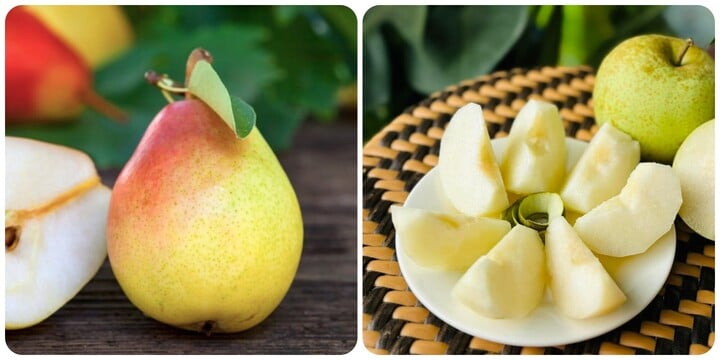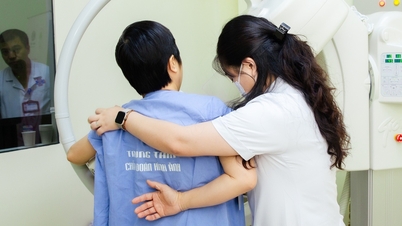Pears and the health benefits of pears
The article on the Medlatec General Hospital website has medical consultation from BSCKI. Duong Ngoc Van said that on average, 100g of pear provides many beneficial nutrients, including: calcium, fiber, potassium, protein, phosphorus, and other essential vitamins such as A, B, C. Every 100g of pear will contain 0.5mg of iron, 86.5g of water, 0.2g of protein, 0.1g of fat, 11g of carbohydrate, 14mg of calcium, 13mg of phosphorus, 1.6g of fiber, 1mg of folic acid, vitamins P, C and beta carotene, 0.2g of vitamin PP.
Looking at the nutritional composition table of pears, we can see that this fruit is really beneficial to health. Therefore, nutritionists also advise that we should eat pears every day to get the following benefits for the body:
Prevent inflammation: active ingredients in pears help reduce pain and inflammation caused by arthritis;
Supplement fiber, improve digestive system: fiber is very good for the digestion process, so those with diarrhea, constipation, and dehydration can add pears to their daily nutritional menu.
Strengthening resistance: vitamins (B2, B3, B6, C and K), minerals (magnesium, calcium, manganese, copper, folate) contained in pears help strengthen the immune system, fighting against pathogens entering the body.
Reduces blood cholesterol levels thanks to the action of fiber and pectin contained in pears.
Reduce the risk of type 2 diabetes: anthocyanin found in pears helps control blood sugar levels, which is very beneficial for patients with type 2 diabetes.
Fight against free radicals : pears contain a lot of vitamin C, K, and copper minerals that help protect the body against the destruction of free radicals;
Weight loss: the calorie content in pears is quite low, combined with the abundant fiber that helps you feel full for a long time, very suitable for those who are planning to lose weight;
Protect cardiovascular health: Antioxidants secreted by pears help limit atherosclerosis and platelet aggregation to form blood clots in the blood vessels. Therefore, eating pears will help reduce the risk of stroke, heart attack and other cardiovascular diseases.
Cancer prevention: thanks to the ability of fiber contained in pears to bind with secondary bile acids, we can prevent the risk of colon cancer or other intestinal problems.
Reduce the risk of osteoporosis: trace minerals and especially boron in pears help the body increase its ability to absorb calcium, which is very beneficial for bone development. If the body is deficient in boron, it will reduce the ability to absorb magnesium, phosphorus, ... this is one of the causes of calcification and osteoporosis.

Pears are good for health but there are some people who need to be careful when eating them.
People who should limit eating pears
Although pears are good for health, not everyone can eat them. Health & Life Newspaper quoted Dr. Nguyen Huy Hoang as advising the following groups of people to be careful when eating pears:
- People with digestive problems: Pears are cold in nature, so people with weak spleen and stomach with symptoms such as bloating, poor digestion, loose stools, and cannot eat cold foods should not eat too much.
- Breastfeeding women: Breastfeeding women should not eat a lot of pears because children's digestive systems are not yet fully developed. According to Oriental medicine, young children's spleen and stomach are still immature, if the mother eats too many pears, which are cold foods, the cold air can enter the milk and affect the child's digestive function.
- Pregnant women: Pregnant women should also eat little or no pears. The process of pregnancy and embryo formation is very important and cannot be taken lightly. Foods that are cold or spicy should not be eaten much.
After giving birth, women have weak bodies, depleted blood and energy, are relatively inactive, and are afraid of wind and cold; pears are a cooling food so should be avoided.
- People with nocturia: Pears also have diuretic effects, so people who often urinate at night or urinate frequently should not eat too many pears.
- People with weak yang energy: If they have symptoms of being afraid of cold, often have loose stools, cold hands and feet, they should not eat a lot of pears. When eating, they should also process the pears into dishes, cook them to prevent the symptoms of cold and dampness from becoming more severe.
In addition, when eating pears, you should not eat them with certain foods such as radishes, amaranth, goose meat... these foods, when interacting with pears, will cause negative effects on health.
Source: https://vtcnews.vn/nhung-nguoi-nen-han-che-an-qua-le-ar905823.html






![[Photo] Prime Minister Pham Minh Chinh chairs the second meeting of the Steering Committee on private economic development.](https://vphoto.vietnam.vn/thumb/1200x675/vietnam/resource/IMAGE/2025/11/01/1762006716873_dsc-9145-jpg.webp)
![[Photo] Lam Dong: Images of damage after a suspected lake burst in Tuy Phong](https://vphoto.vietnam.vn/thumb/1200x675/vietnam/resource/IMAGE/2025/11/02/1762078736805_8e7f5424f473782d2162-5118-jpg.webp)

































































































Comment (0)